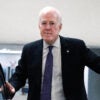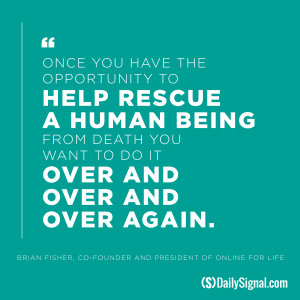Every day, 3,500 abortions take place in America. That’s approximately one abortion per every 25 seconds.
The pro-life nonprofit Online for Life wants that statistic to change, and just celebrated a milestone of their own: 3,500 babies saved.
It didn’t come easily. Brian Fisher, co-founder and president of Online for Life (OFL), has spent the past few years bringing together a network of individuals who are passionate about reaching women at risk of aborting a child.
The Daily Signal depends on the support of readers like you. Donate now
Their goal, he says, is to make the procedure “unthinkable” in America–and unavailable in different cities across the country.
“Our entire organization is centered on the fact that God creates each and every human life,” Fisher says. “And from conception through natural death, they have unlimited potential and priceless value. [We aim] to provide a level of care and compassion and grace to a hurting woman whereby abortion wouldn’t need to be an option,” Fisher says.

When abortion-related terms are searched for online, advertisements from Online for Life pop up. In January 2014 Shandriell Googled abortions in her area. She was connected with a Pregnancy Resource Center where they helped her process through the options she had for her pregnancy. (photo: Online for Life.)
The Initial ‘Wake-Up Call’
Fisher never prepared for a career as a pro-life champion.
“God dragged me to it,” he says. “I really was not a willing participant.”
Fisher describes his “conversion” to being fully dedicated to helping hurting women and families at risk for abortion as a gradual process and an education.
“I grew up in the church, so I was always pro-life intellectually but never really did anything about it,” he says.
The initial “wake-up call,” as he calls it, took place in 1999 with the birth of his first son.
10 years later, after moving to Dallas for another job, he began developing OFL as a volunteer organization in 2009. As God continued to “press him,” he says, he reached a crossing point after OFL rescued their first baby from abortion in 2010.
“I immediately went from being a somewhat reluctant participant to being, as my staff would say, obsessed with ending abortion,” Fisher recalls. “Because once you have the opportunity to help rescue a human being from death you want to do it over and over and over again.”
OFL began to function as a full-time organization in 2012, and today reaches out to women in crisis through the Internet to provide a pro-life alternative to abortion. For example, when abortion-related terms are searched in a search engine, an advertisement suggesting a woman call OFL for more information pops up. When she does, an onsite call center then schedules an appointment for the woman at a pro-life pregnancy care clinic.
Today, OFL operates two of their own women’s care clinics (in addition to their Dallas location, they have a second center in Pittsburgh), and has a partnership with 30 other independent pregnancy centers.
Fisher hopes to expand the two women’s care clinics operated by OFL to 23 care clinics within the next five years.
‘The Holocaust of Our Time’
After working for OFL for four years, Fisher figures the impact of abortion in America may be incalculable.
“There is no greater Holocaust in American history,” he says. “Most folks don’t yet understand the degree to which [abortion is] ripping apart the fabric of American life.”
The over 3,500 babies OFL has helped saved are documented on their website.
Yet some stories still don’t end the way Fisher and his colleagues hope. Some women come in for care and still choose abortion for their baby.
“We want to be there for them as well,” he says, noting that most of the women’s care clinics offer post-abortive counseling.

Sonograms are offered at women’s care clinics. Shandriell was able to hear the heartbeat of her unborn baby while getting a Sonogram. (Photo: Online for Life)
“The decision to abort in some cases is just birth control to some women,” Fisher explains. “But in many cases, it is an extremely difficult decision because [these women] feel they have no other options.”
“Our job is to give them the security they need,” he adds.
OFL provides that security through education, resources, and access to ministries and churches to ensure women they “can have their baby and still be in a good spot.”
“There is no greater opportunity to not only extend grace and forgiveness to the tens of millions of people who have aborted but to save millions and millions of children who are in fact our future,” Fisher says.
Indeed, the two OFL clinics offer caretakers the ability to pray with clients.
“It’s a wonderful hands and feet expression of the Gospel,” Fisher says.































